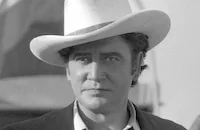Richard Dix stars as an American Casanova in Too Many Kisses (1925), a romantic comedy that pits Dix against William Powell over the affections of a local girl (Frances Howard) in France's remote Basque country. For many film buffs, however, this silent comedy is best known as the first screen appearance of Harpo Marx and the earliest screen appearance of any of the Marx Brothers. Harpo was appearing with his brothers in their first Broadway show, I'll Say She Is, when he filmed his supporting role as the "Village Peter Pan." According to Harpo, his part was cut down in the finished feature. "It seems the cutters had been at work on the film and they hadn't figured my acting amounted to much," he remarked to a journalist in 1929. It's also Harpo's only "speaking" role on the big screen, even if his only line is written in an intertitle. For the record, his line is "You sure you can't move?" Film critic Mordaunt Hall, writing in The New York Times upon its March 1925 release, found the film "constantly amusing light entertainment, just the thing to make one forget the cold wind and changeable weather."
The film was thought lost for decades, and even after a print was discovered in 1971 it remained (apart from brief fragments) unavailable for public viewing. Film Preservation Society spearheaded a restoration in partnership with Paramount Pictures and the Library of Congress in 2020 and commissioned Harpo's son, composer Bill Marx, to create the musical score. "I had never done any music for a silent film," explained the younger Marx. "So my dad’s first silent is also mine."
by Sean Axmaker
Sources:
Movie Comedy Teams, Leonard Maltin. Plume, 1985.
"The Screen: Too Many Kisses," Mordaunt Hall. The New York Times, March 3, 1925.
"Too Many Kisses," Mikael Uhlin. Marxology, accessed October 20, 2020.
"Too Many Kisses," unsigned article. Film Preservation Society website, October 2, 2020.
AFI Catalog of Feature Films





















